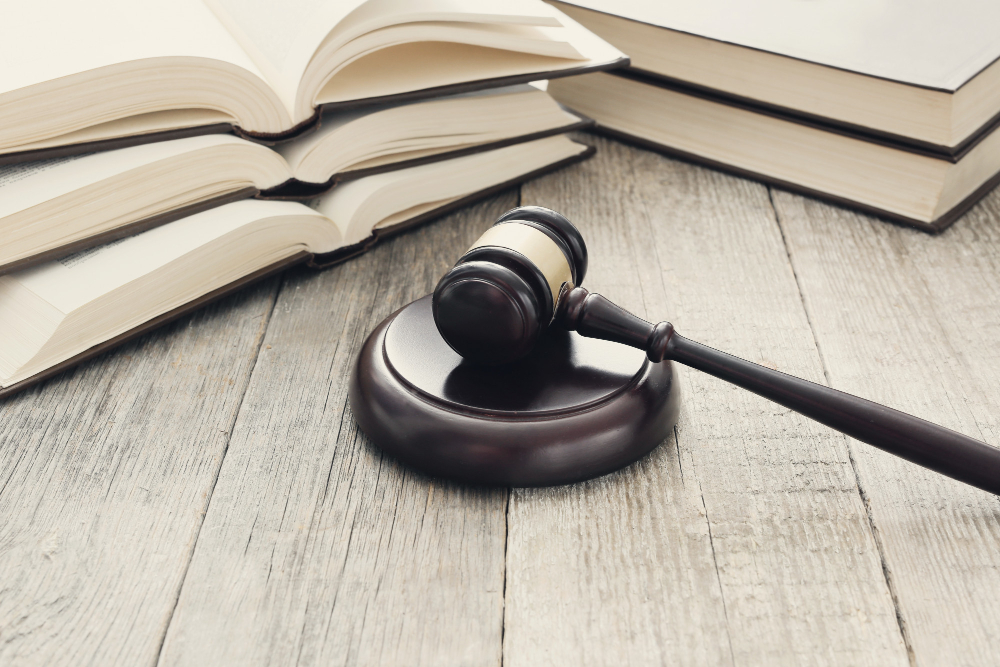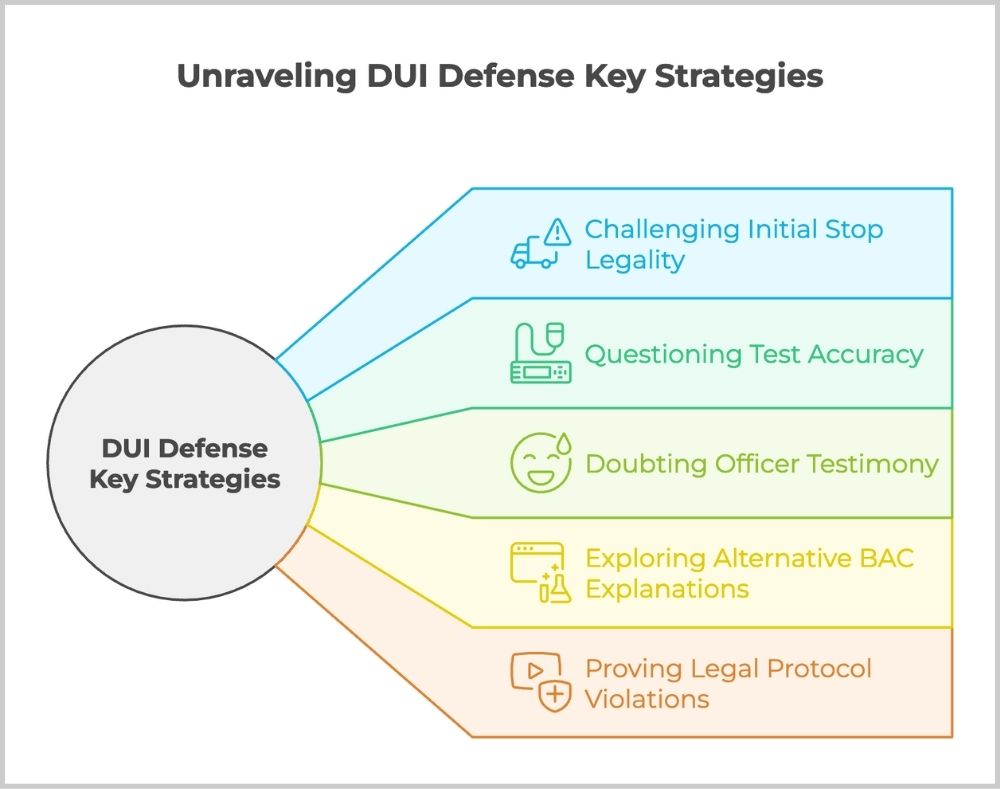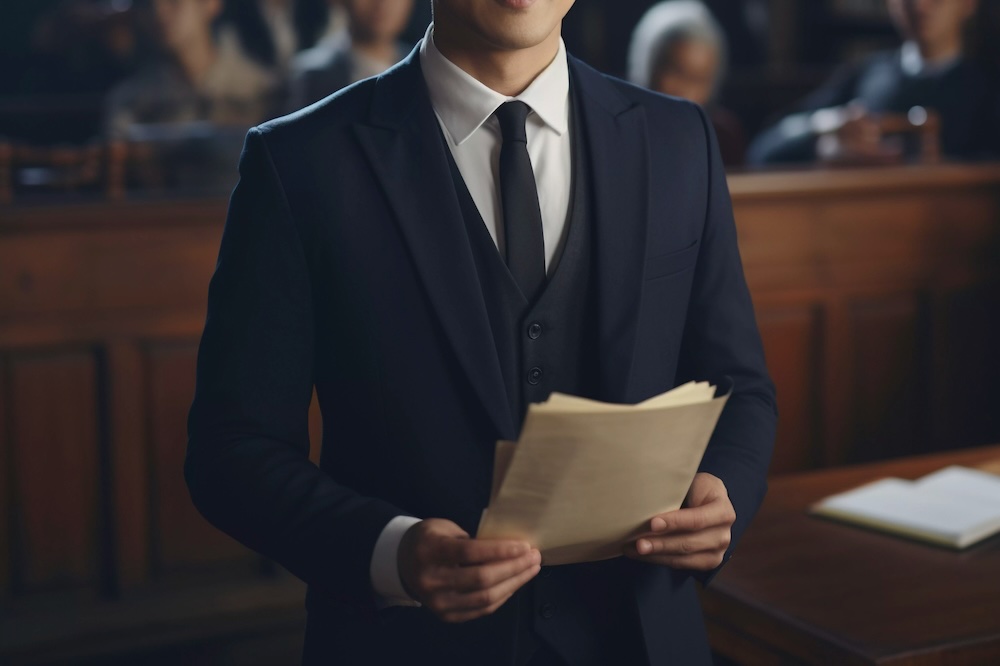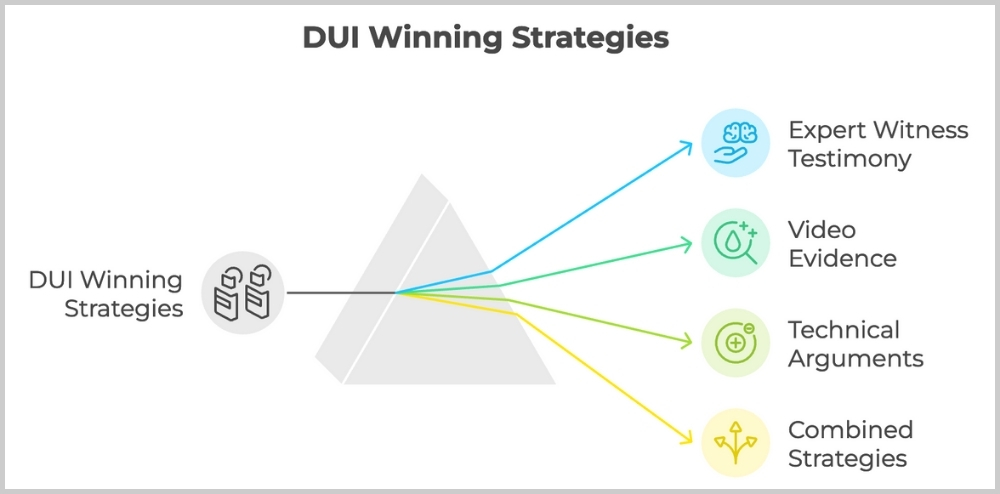How a Lawyer Can Fight (and Win!) Your DUI Charge
Last Updated: November 6, 2024
Driving under the influence (DUI) charges in Canada are serious offenses that can have far-reaching consequences on an individual’s life.
Under the Criminal Code of Canada, operating a motor vehicle while impaired by alcohol or drugs is a criminal offense, carrying potential penalties including:
- hefty fines,
- license suspensions,
- mandatory education programs,
- and even imprisonment for repeat offenders.
Beyond the immediate legal ramifications, a DUI conviction can have long-lasting effects on one’s personal and professional life, including travel restrictions, increased insurance premiums, and limitations on employment opportunities.
Given the severity of these potential outcomes, the importance of skilled legal representation who know how to win a DUI case in court cannot be overstated.
An experienced DUI lawyer can be the difference between a conviction and an acquittal, or between harsh penalties and more lenient alternatives. These legal professionals possess in-depth knowledge of Canadian DUI laws, understand the nuances of police procedures and testing methods, and are adept at identifying potential weaknesses in the prosecution’s case.
This article will explore the various strategies and tactics that lawyers employ to fight DUI charges in Canada, illustrating how legal expertise can significantly impact the outcome of these cases.

Understanding DUI Charges
In Canada, Driving Under the Influence (DUI) charges, officially termed “impaired driving” or “operation while impaired,” encompass a range of offenses related to operating a motor vehicle while affected by alcohol or drugs.
To fully grasp the scope of these charges, it’s essential to understand what constitutes a DUI offence and to dispel common misconceptions about DUI laws.
A DUI charge can be levied in several circumstances.
The most well-known is when a driver’s Blood Alcohol Concentration (BAC) exceeds the legal limit of 80 milligrams of alcohol per 100 milliliters of blood (0.08%).
This is a criminal offence under Section 320.14(1)(b) of the Criminal Code. However, it’s crucial to note that impairment charges can be laid even if the BAC is below this threshold if there’s evidence that the driver’s ability to operate a vehicle is impaired by alcohol or drugs.
Another situation that can lead to a DUI charge is the refusal to provide a breath, blood, or drug sample when demanded by a police officer.
This refusal is a separate criminal offence under Section 320.15 of the Criminal Code and carries penalties often as severe as those for impaired driving itself. The law considers this refusal as an attempt to obstruct justice.
With the legalization of cannabis in Canada, there’s increased focus on drug-impaired driving. Drivers can be charged with DUI if they’re found to be impaired by any drug, including legal prescription medications.
For cannabis, specific THC blood concentration limits have been established that can result in charges.
Several common misconceptions about DUI laws persist among the public.
- One prevalent myth is that consuming one alcoholic drink won’t put a person over the legal limit. In reality, BAC can vary significantly based on factors like body weight, metabolism, and food consumption, meaning even one drink could potentially impair driving ability or put some individuals over the limit.
- Another misconception is that refusing a breathalyzer test is a way to avoid a DUI charge. In fact, as mentioned earlier, this refusal is a criminal offence in itself with serious consequences.
- There’s also a common misunderstanding about prescription drugs and DUI charges. Many people think that because a medication is legally prescribed, it can’t lead to a DUI charge. In reality, any substance that impairs driving ability, including legal prescription medications, can result in DUI charges if it affects one’s ability to operate a vehicle safely.
Understanding these aspects of DUI law in Canada is vital for both prevention and defence. It highlights the importance of making informed decisions about alcohol and drug consumption in relation to driving and underscores the need for professional legal advice when facing DUI charges.
Key Strategies Lawyers Use to Fight DUI Charges
The best DUI defence tactics by lawyers are designed to challenge the evidence, question the procedures followed by law enforcement, and explore alternative explanations for the alleged impairment. The following are some key legal defences against DUI charges.

- Lawyers may argue that there was no reasonable suspicion for the initial stop, which is a requirement under Canadian law.
- If it can be proven that the officer lacked a valid reason to pull the driver over, any evidence gathered as a result of the stop may be deemed inadmissible. Additionally, lawyers may assert that the stop violated the client’s rights under the Canadian Charter of Rights and Freedoms, particularly Section 8, which protects against unreasonable search and seizure, and Section 9, which guards against arbitrary detention.
- Questioning the accuracy of breathalyzer and field sobriety tests is another common strategy.
- Lawyers may scrutinize the calibration and maintenance records of breathalyzer devices, looking for any irregularities that could cast doubt on the test results. They may also examine whether the tests were administered correctly by law enforcement officers. Any deviation from standard procedures in conducting these tests can be grounds for challenging the validity of the results. Expert witnesses may be called upon to testify about the reliability of the testing equipment or the proper protocols for administering such tests.
- Raising doubts about officer testimony can be an effective way to weaken the prosecution’s case.
- Skilled lawyers will look for inconsistencies in the officer’s account of events or a lack of corroborating evidence. They may also investigate the arresting officer’s record for any past instances of misconduct or credibility issues that could be used to question their testimony. Cross-examination of the officer during trial is a critical opportunity to expose any weaknesses or contradictions in their account.
- Exploring alternative explanations for BAC levels is a strategy that can be particularly effective in cases where the breathalyzer results are just over the legal limit.
- The “rising blood alcohol” defence argues that the driver’s BAC was actually below the legal limit while driving but rose to exceed the limit by the time the test was administered. Lawyers may also explore whether medical conditions such as gastroesophageal reflux disease (GERD) or diabetes could have affected the breathalyzer results. Expert testimony from medical professionals can be crucial in supporting these arguments.
- Proving violation of legal protocols is another avenue that lawyers may pursue. This involves a thorough examination of whether proper arrest and detention procedures were followed by law enforcement.
- Any failure to adhere to these protocols, such as not reading the client their rights or denying them access to legal counsel, can potentially lead to the exclusion of evidence or even the dismissal of charges. Lawyers will also scrutinize whether the client’s rights were clearly communicated, as required by law.
Each of these strategies requires a deep understanding of both the law and the scientific principles underlying impaired driving detection. Skilled DUI lawyers will often employ a combination of these approaches, tailoring their defence strategy to the specific circumstances of each case.

When DUI Charges Get Dropped or Reduced
In the realm of DUI defence, there are several scenarios where charges may be dropped or reduced, offering a more favorable outcome for the accused.
Understanding these possibilities is crucial for those facing DUI charges, as it highlights the importance of a strong legal defence and the potential for mitigating the consequences of an arrest.
Suppression of evidence is a powerful legal tool that can lead to charges being dropped or significantly weakened.
This occurs when a judge rules certain evidence inadmissible due to procedural errors or violations of the accused’s rights. For instance, if a lawyer successfully argues that the traffic stop was conducted without reasonable suspicion, any evidence gathered as a result of that stop – including breathalyzer results or field sobriety test observations – may be suppressed. Similarly, if it’s proven that the breathalyzer device was not properly calibrated or maintained, its results could be deemed unreliable and therefore inadmissible. When key evidence is suppressed, prosecutors may find their case substantially weakened, often leading to reduced charges or even dismissal.
Plea bargains represent another avenue through which DUI charges may be reduced.
In this process, defence lawyers negotiate with prosecutors to secure a plea to a lesser charge in exchange for a guilty plea. A common example in DUI cases is pleading to “Careless Driving” instead of impaired driving. This approach can be particularly beneficial as it often results in less severe penalties and may avoid the criminal record associated with a DUI conviction. The success of plea negotiations often depends on factors such as the strength of the evidence, the defendant’s prior record, and the skill of the defence attorney in highlighting weaknesses in the prosecution’s case.
Case dismissal, where charges are dropped completely, represents the best possible outcome for someone accused of DUI.
This can occur for various reasons. Sometimes, a thorough investigation by the defence team reveals fundamental flaws in the prosecution’s case, such as a complete lack of probable cause for the initial stop or arrest. In other instances, key witnesses may become unavailable, or crucial evidence may be lost or compromised. Procedural errors, such as failure to read the accused their rights or denial of their right to counsel, can also lead to dismissal if they’re deemed to have significantly violated the accused’s rights. Additionally, if the prosecution fails to bring the case to trial within the statutorily required time frame (known as the right to a speedy trial), this can also result in dismissal.
It’s important to note that the likelihood of charges being dropped or reduced varies greatly depending on the specific circumstances of each case, the jurisdiction, and the approach of the local prosecution.
Winning Strategies in Court
When a DUI case proceeds to trial, skilled defence lawyers employ a range of sophisticated strategies to create reasonable doubt and secure a favorable outcome for their clients. These courtroom tactics are designed to challenge the prosecution’s evidence, provide alternative explanations for the alleged impairment, and ultimately convince the judge or jury of the defendant’s innocence or the unreliability of the evidence against them.

Presenting expert witness testimony is a powerful strategy that can significantly strengthen a defence case.
Expert witnesses, such as toxicologists, forensic scientists, or medical professionals, can provide crucial insights that challenge the prosecution’s interpretation of evidence. For instance, a toxicologist might testify about the complexities of alcohol absorption and elimination in the body, potentially supporting a “rising blood alcohol” defence.
A medical expert could explain how certain health conditions, like acid reflux or diabetes, can affect breathalyzer results, casting doubt on their accuracy. These experts can also help the court understand the limitations and potential flaws in field sobriety tests or breathalyzer devices. Their specialized knowledge can be instrumental in creating reasonable doubt about the reliability of the evidence presented by the prosecution.
Using video or dashcam footage, when available, can be a game-changing strategy in DUI trials.
This visual evidence can provide an objective account of the traffic stop, the defendant’s behavior, and the administration of field sobriety tests. Defence lawyers may use this footage to contradict officer testimony, demonstrate that the defendant did not appear impaired, or show procedural errors in how tests were conducted. In some cases, dashcam footage might reveal that there was no valid reason for the initial traffic stop, potentially leading to the suppression of all subsequent evidence. Even if the footage doesn’t completely exonerate the defendant, it can often paint a more nuanced picture of events that may work in the defendant’s favor.
Employing technical arguments to create reasonable doubt is another crucial strategy in DUI defence.
This approach involves meticulously examining and challenging every aspect of the prosecution’s case. Defence lawyers might question the scientific principles behind breathalyzer technology, highlighting potential sources of error or inaccuracy. They may delve into the maintenance records of testing equipment, looking for lapses in calibration or servicing that could affect reliability.
Arguments might be made about the margin of error in BAC testing and how this could place the defendant’s actual BAC below the legal limit.
Lawyers may also scrutinize the chain of custody for blood samples, looking for any irregularities that could compromise the integrity of the evidence. By raising these technical issues, defence attorneys can create uncertainty about the accuracy and reliability of the evidence, potentially swaying the court in their client’s favor.
Additionally, defence lawyers often combine these strategies for maximum effect.
For example, they might use expert testimony to explain the significance of certain behaviors seen in dashcam footage, or to interpret the implications of technical flaws in testing procedures. They may also use cross-examination of prosecution witnesses, including arresting officers and state experts, to highlight inconsistencies or weaknesses in the prosecution’s case.

What to Look for in a DUI Lawyer
When selecting a DUI lawyer in Canada, there are several crucial factors to consider to ensure you receive the best possible representation.
First and foremost, experience with DUI cases is paramount.
Look for a lawyer who specializes in or has extensive experience handling impaired driving cases. This specialized experience means they are likely to be well-versed in the latest DUI laws, defence strategies, and scientific aspects of alcohol and drug testing.
Equally important is the lawyer’s track record of winning cases or successfully reducing charges.
While past results don’t guarantee future outcomes, a history of favorable plea bargains, charge reductions, or acquittals indicates the lawyer’s skill in navigating DUI cases. Don’t hesitate to ask potential lawyers about their success rates and specific examples of how they’ve helped clients in similar situations.
Additionally, local knowledge of provincial DUI laws and court practices can be a significant advantage.
Each province may have nuances in its DUI laws, and local courts often have specific procedures and tendencies.
A lawyer familiar with the local legal landscape, including relationships with prosecutors and judges, can often navigate the system more effectively. This local expertise can be invaluable in developing a tailored defence strategy and potentially negotiating more favorable outcomes.
When interviewing potential DUI lawyers, inquire about their familiarity with the specific court where your case will be heard and their experience with local prosecutors and judges.
Final Thoughts
Facing a DUI charge in Canada is a serious matter with potentially life-altering consequences. Throughout this article, we’ve explored the complexities of DUI laws, how a lawyer can help beat a DUI charge, and the potential for favorable outcomes when cases are handled expertly. This information underscores one critical point: the immense importance of consulting with an experienced DUI lawyer to improve your chances of a favorable outcome.
A knowledgeable DUI lawyer brings a wealth of expertise to your case. They can navigate the intricate legal landscape, challenge evidence, negotiate with prosecutors, and employ sophisticated defence strategies that may not be apparent to those unfamiliar with DUI law.
From questioning the legality of the traffic stop to presenting compelling expert testimony in court, these legal professionals have the tools and knowledge to potentially reduce charges, secure acquittals, or minimize penalties.
It’s crucial to emphasize that time is of the essence when facing DUI charges. The legal process begins immediately after an arrest, and important deadlines can approach quickly. Prompt action is necessary to protect your legal rights and to ensure that all available defence options are explored. Delays in seeking legal counsel can result in missed opportunities to challenge evidence, negotiate with prosecutors, or prepare a robust defence strategy.
We strongly encourage readers who find themselves facing DUI charges to act quickly and decisively. Your future may depend on the actions you take today. Protect your rights, your reputation, and your freedom by booking a free consultation today.
Get A Free Consultation
"*" indicates required fields



